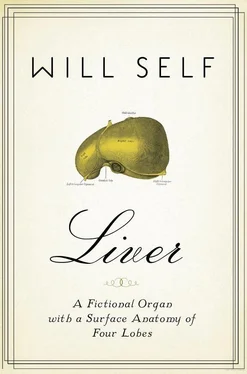On her body went, frogmarching Joyce up the trails of the Zürichberg, while behind her the sleepy suburb slumbered. The previous Tuesday she had had a letter from Father Grappelli on headed diocesan paper. With tongue twice-tied — by formality, by estrangement — he had informed her that Monsignor Reiter would be returning from Rome in the next few days. The initial response of the Sacred Congregation for the Causes of Saints had been encouraging, and in view of this the Bishop would like to assemble a second report. Would it be possible for Frau Beddoes to —?
But no , she had thought, why should I? Not only assist in the beatification of the goofy Stauben girl — a ridiculous notion — but also be compelled to speak English again, with all the messy intimacy that this would entail. Confined, for day after day, to the certitudes of Gru ezi, Guten Abend, Bitte, Danke , and the naming of small needs, Joyce had become ein verschlossenes Volk of one; she almost believed that this was the limit of any possible communication, while beyond lay only this hillside: the dense curtains of yellow and grey-green needles, the stink of their sap stronger than creosote; the undergrowth parched and crackling, with midges swirling over the boggy hollows; and the grasshoppers pulsing like blood.
Her body wouldn’t let Joyce stop for long at the gates of the Fluntern Cemetery, but shoved her on down the Zürichbergstrasse into town. It was still before nine, and under their wide eaves the deeply recessed windows of the houses were blank eyes on the world. What could they have seen anyway on this overcast morning? Only the flapping black silhouette, a ghost of the civic dead.
At the Bellevue Bridge, Joyce had to wait; the Frauenbad — the women’s bathing area — wasn’t open yet. A few other, younger women were lingering on the quayside by the Stadverwaltung, and when the custodian came to open the turnstile they roused themselves and headed for the changing cubicles at a neat clip. The enclosed pool, which was fed with water from the lake, was clearly visible from the surrounding buildings, yet a few of the women bathed here in the nude. Joyce had never considered doing such a thing, but this morning her stupid blind body made the decision for her, by folding its clothing neatly, placing this mound on top of its shoes in the locker, then chucking on top of this both towel and swimming costume.
Joyce’s body threw her into the water — an aggressive dive; then its arms dragged her, while its feet kicked her, up and down the length of the pool. Up and down, up and down — two lengths, four, then fourteen. It was untiring, this body of hers, and the gaggle of girls who had entered the water with her gave up long before Joyce, disengaging themselves from its chilly embrace to pace the concrete surround. Their breasts and buttocks and thighs were, Joyce judged, babyishly soft, and wobbled as they rubbed themselves ruddy. When Joyce’s body hauled her out — no need for the ladder — she couldn’t fail to notice the contrast between her own trim, adult form and these graceless maidens.
Perhaps drawn by this elderly lady’s vitality, they seemed to want to talk to her; one mountainous Valkyrie came over and offered her some mineral water. However, Joyce’s body had other ideas: it hustled her away, towelled her down, dressed her and then escorted her off the premises.
Once she had regained the top of the hill, Joyce was fully intending to take the trail that led off behind the Zürichberg Hotel, through a series of grassy clearings, and so, eventually, home. A hot dry wind had begun to stir the trees, and she knew what this was — the Föhn . The oppressive feeling she had had all morning, that the very sky was smothering her, was this down-draught of hot air from the mountains.
Far from being enervated by the F  hn , her wild body hearkened to its soughing and pulled her the opposite way, on through the woods towards Rigiblick. Then, at the second waymarker, it forced her in the direction of Forch. From previous excursions Joyce knew that this was the beginning of a five-hour hike, and, with the temperature rising and no water with her, this would be at best uncomfortably debilitating; at worst it could prove fatal .
hn , her wild body hearkened to its soughing and pulled her the opposite way, on through the woods towards Rigiblick. Then, at the second waymarker, it forced her in the direction of Forch. From previous excursions Joyce knew that this was the beginning of a five-hour hike, and, with the temperature rising and no water with her, this would be at best uncomfortably debilitating; at worst it could prove fatal .
Agnus Dei, qui tollis peccata mundi, dona eis requiem. Agnus Dei, qui tollis peccata mundi, dona eis requiem sempiternam. Lamb of God, who takest away the sins of the world, grant them everlasting rest.
Joyce cavilled as sure feet took her along the trail. Combed by the Föhn , the myriad needles of spruce, fir and pine formed ominous figures in the undulating green carpet. She tried to ignore them and busy herself with memories of a convivial past, not lamb of God but leg of lamb, mint sauce, red wine. A family Sunday lunch, Isobel — at her best age, ten or eleven, not rebellious yet. Derry vigorously carving the joint. the scent of rosemary , as if a Provenc al hillside had been raised up out of the Birmingham suburbs.
Her wayward body was having none of it; it got at Joyce’s hurting head from behind, prodding her on through the forest: Et-er-nal rest, et-er-nal rest , the 4/4 beat of its footfalls a forced military march. On Joyce went, through the shuttered-up town of Forch, then back into the woods, and finally she arrived at the monument, the Forchdenkmal.
Joyce had visited this before and thought nothing of it, but on this fetid and dismal outing the iron blob on its wide plinth struck her as unspeakably disgusting, cream or excrement dolloped from the heavens. The legend Die ewige Flamme — ‘The Eternal Flame’ — had been inscribed in runic script on the stepped pyramid of the monument. There was also a desiccated wreath, and buried in its crispy core Joyce saw the white-out-of-red Swiss cross. But what war dead could this wreath possibly be honouring after five hundred years of democracy, peace and brotherly love?
Towards dusk Joyce returned to Saatlenstrasse. Her body showered itself, fed and watered itself, because that’s what bodies did — but it wasn’t remotely tired. The F  hn , a feverish zephyr, rubbed its sweaty flank against the apartment block, while inside the flats the static crackled.
hn , a feverish zephyr, rubbed its sweaty flank against the apartment block, while inside the flats the static crackled.
When she moved in, Joyce bought a television and a radio at Sihl City. She’d never turned them on, preferring to listen to the orderly burr of the lives surrounding her. But this evening, with the temperature still rising, the Pfeiffer children were running riot up and down the communal stairs, and Joyce longed to shout them down. Eventually, young Frau Pfeiffer lost her temper and began screaming ‘ Bis ruhig! Bis ruhig! ’ over and over again, until she sobbed up the scale, her hysteria in maddening counterpoint to the bleeps and peeps of Herr Siemens’s electronic music.
As the dusk gathered, and a semblance of calm returned to the building, Joyce sorted through her papers and put them in order. It was necessary to write a long, lucid and fairly complex letter to the authorities, and another, shorter one to Isobel, who was being held on remand at Hindelbank, the women’s prison outside Berne.
Joyce wished she had a computer — or at least a typewriter — with which to set down all these words: her fingers ached from the unfamiliar tension of holding a pen. Darkness seeped into the small living room as she scratched away at the thin sheets of paper; outside, a sparrow buffeted by the hot wind perched wonkily on the street lamp, then dropped to the ground.
Читать дальше

 hn , her wild body hearkened to its soughing and pulled her the opposite way, on through the woods towards Rigiblick. Then, at the second waymarker, it forced her in the direction of Forch. From previous excursions Joyce knew that this was the beginning of a five-hour hike, and, with the temperature rising and no water with her, this would be at best uncomfortably debilitating; at worst it could prove fatal .
hn , her wild body hearkened to its soughing and pulled her the opposite way, on through the woods towards Rigiblick. Then, at the second waymarker, it forced her in the direction of Forch. From previous excursions Joyce knew that this was the beginning of a five-hour hike, and, with the temperature rising and no water with her, this would be at best uncomfortably debilitating; at worst it could prove fatal .










